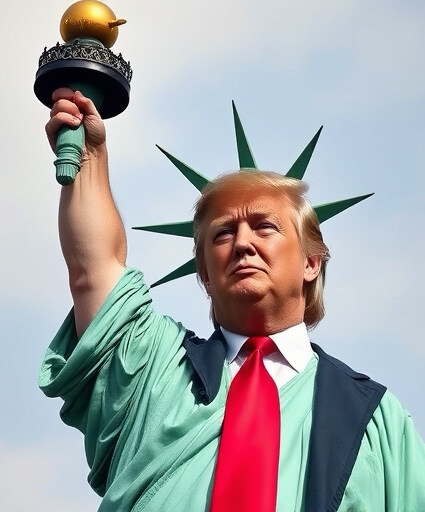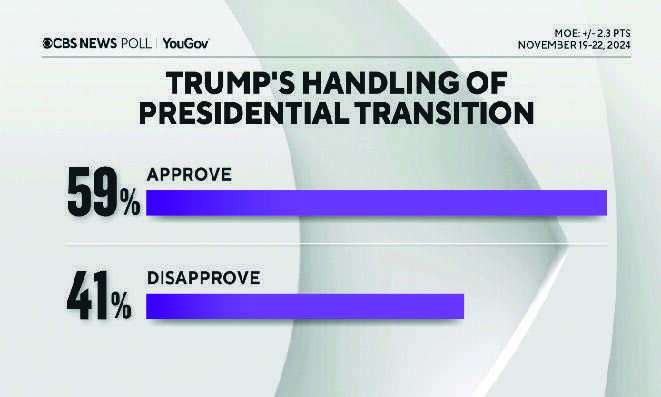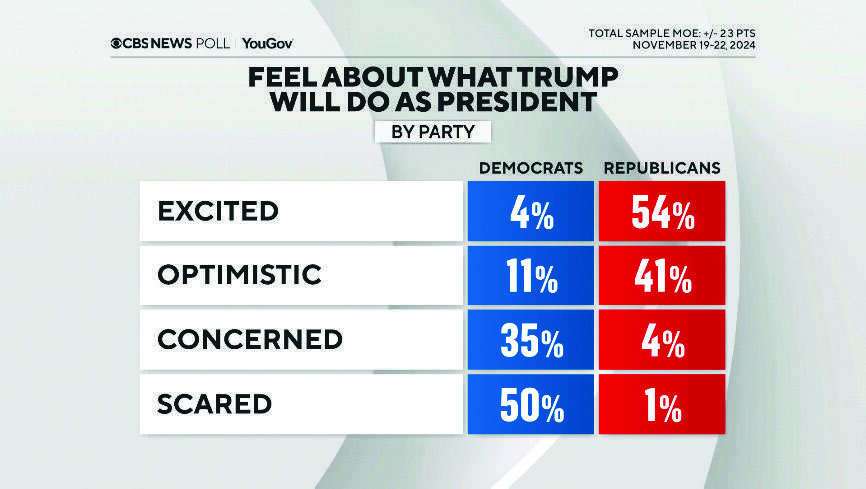Winter 2024
Land of Liberty – Trump Unbowed
Donald J. Trump’s re-election as the President of the United States has been hailed by many as the “greatest political comeback ever.” It is not just a comeback for Trump but for the American people as well. The popular internet saying, “We Are So Back,” has been repurposed as an impassioned mantra for those celebrating Trump’s win. For many, this victory feels like a return to something better—a promise that the country is on the right track again.
This sentiment of renewal resonates deeply with Trump’s supporters, who view his re-election as a validation of their America First values, prioritising American interests across economic policy, security, and international relations.

Source: AI generated image
Shift in Public Sentiment
As of three weeks after the election, 59% of Americans approve of Trump’s handling of the presidential transition, according to a CBS/YouGov poll. This level of approval is rare in modern American politics, suggesting a shift in the national mood. Even some of Trump’s critics have acknowledged the magnitude of his comeback. While not all Americans share the optimism of his supporters, the approval numbers suggest that a significant portion of the population is willing to give Trump a chance to succeed in his second term.
This optimism is particularly striking given the divisions that have characterised US politics in recent years. For Trump’s supporters, his victory symbolises a vindication of their concerns, values, and aspirations. Many feel that their voices, long marginalised or dismissed by the political establishment, have finally been heard. This sense of empowerment has translated into a renewed enthusiasm for civic engagement, with many Americans eager to play a more active role in shaping the country’s future.
The high approval ratings for Trump’s transition also suggest that his message and policies are resonating beyond his core base. Trump performed better with Hispanic voters, Black voters, and Asian voters than in previous elections. Surprisingly, he also outperformed with both women and younger voters (18−29 years old). Voters from all demographics have shown signs of warming to Trump’s leadership, reflecting a broader desire for pragmatic solutions to the actual challenges they face in their lives—not the concocted challenges the Democrats and media told them they face. This widened base of support could play a crucial role in shaping the policies and priorities of his second term.
Renewed Sense of Patriotism
In the backdrop of these political shifts, there appears to be a resurgence of patriotism among the American public. Patriotism, once a defining feature of American identity, has experienced a noticeable decline over the past few decades. In the 1980s, national pride was woven into the fabric of everyday life—seen in family traditions, religious practices, schools, entertainment, and sports. Over time, however, this shared sense of pride seemed to fade, eroded by cultural and political divisions.
Trump’s victory, for many, represents a rekindling of this patriotic spirit. His campaign emphasised themes of resilience, unity, and American exceptionalism, resonating with voters who longed for a return to these values. The cultural shift is particularly evident among younger generations, who are finding new ways to express their pride in the country. For example, athletes who once protested during the national anthem by “taking a knee” in the name of social justice are now embracing Trump’s influence.
Approval for the transition suggests Trump’s message is resonating beyond his base.
The “Trump dance”—a celebratory hip shimmy seen after touchdowns and victories—has become a new cultural phenomenon, signalling a broader shift in how patriotism is publicly expressed. From the NFL to tennis, soccer, golf, and the UFC, this shift marks a stark contrast to the politically charged protests of the previous decade, signalling a cultural return to national pride.
This resurgence of patriotism extends beyond sports and entertainment. Across the country, communities are finding renewed interest in local government and civic participation. Town hall meetings, school board meetings, and other public events are seeing increased attendance as people are realising, they have agency.
MAGAvengers and an Ideologically Diverse Administration
The tide may have turned for Trump on that fateful day in July when an unsuccessful attempted assassination unexpectedly galvanised support. The now-iconic image of Trump, fist raised in front of the American flag, captured a spirit of resilience that resonated deeply with Americans across the political spectrum. For example, Meta CEO Mark Zuckerberg, who was on less-than-favourable terms with Trump at the time, told Bloomberg, “As an American, it’s hard not to get emotional about that spirit and that fight, and I think that’s why a lot of people like the guy.”
It was not just Zuckerberg who was inspired by that iconic photo of Trump fist-pumping the air in front of the American flag. Shortly after a gunman tried to take his life, Elon Musk endorsed him.
One of the most striking aspects of Trump’s re-election campaign was the coalition of high-profile figures who rallied to his side. Dubbed the “MAGAvengers,” this group included Vice President-elect JD Vance, Elon Musk, Vivek Ramaswamy, Tulsi Gabbard, and Robert F. Kennedy Jr. Together, they represented a broad spectrum of political ideologies and personal backgrounds, reflecting Trump’s ability to appeal to a diverse range of voters. Their support helped attract “low propensity” voters, who were crucial in securing Trump’s victory.

Source: CBS News/YouGov
Since winning the election on 5 November, Trump has moved quickly to assemble his administration. By any measure, the team he is putting together is one of the most unconventional and ideologically diverse in US history. While most of the potential administration falls into a populist or America First category, that is where the commonalities end. For one thing, quite a few of the picks are former Democrats.
Musk, Gabbard and Kennedy all recently voted for Democrats with the latter two having run for office as Democrats. Like many American voters, these former Democrats felt Trump had something to offer since the “left had left them”. The other theme amongst the choices the President is making is that almost all of them are anti-Washington establishment. At the very least they are anti-Washington elites.
In many cases, like President Dwight D. Eisenhower, Trump has opted for business leaders or other best-in- class experts from the private sector over longstanding government bureaucrats. One of the most innovative initiatives announced so far is the Department of Government Efficiency (DOGE), a non-governmental advisory committee led by Musk and Ramaswamy.
Tasked with reducing regulation, cutting spending, and fostering an entrepreneurial approach to governance, DOGE has already garnered support from unlikely allies, including “lefty” Senator Bernie Sanders who said he will be happy to support the program if it can make cuts to the budget of the Pentagon which just failed its seventh audit and has lost “billions”. The committee’s success could serve as a model for future bipartisan cooperation, demonstrating that even deeply divided political factions can find common ground on issues of national importance.
Energy Independence and Economic Stability
Energy policy has re-emerged as a core policy of Trump’s agenda for his second term. Recognising the critical role of affordable energy in driving economic growth, the administration has prioritised energy independence as a key objective. This commitment reflects a broader belief that energy is essential for maintaining America’s economic stability, global competitiveness, and national security.
Trump’s focus on energy independence has resonated with voters who are concerned about rising costs and economic uncertainty. For many Americans, access to affordable energy is a non-negotiable pillar of their quality of life, influencing everything from transportation to home heating. Americans feel they work too hard, pay too much in taxes, and are unwilling to give up their cars, air conditioning, or other essentials for a climate “emergency” that is far lower on their list of priorities.
After telling the audience at his election night watch party what a “great guy” Kennedy was and how he intended to “Make America Healthy Again,” Trump’s light-hearted remark to “stay away from the liquid gold Bobby” appeared to signal that he was serious about making good on his promise to “drill, baby, drill.”
At the same time, Trump’s energy policies are likely to have significant implications for international relations. By reducing dependence on foreign energy sources, the US could strengthen its position as a global leader, leveraging its energy resources to promote stability and prosperity around the world.

Source: CBS News/YouGov
Border Security and Sovereignty
Trump’s re-election campaign reaffirmed his unwavering commitment to securing the nation’s borders, a cornerstone of his political platform since 2016. The promise to “build the wall” was more than a slogan—it was a pledge to prioritise national security, uphold the rule of law, and protect American workers. His re-election victory has reinvigorated this promise, placing border security at the forefront of his second term agenda.
One of the administration’s first moves post-election will be the reinstatement of the Remain in Mexico policy, a highly effective measure requiring asylum seekers to wait in Mexico while their claims are processed. Trump has also vowed to expedite the completion of the border wall, with new construction already underway in key areas.
To lead these efforts, Trump has appointed former Immigration and Customs Enforcement (ICE) Director Tom Homan as the administration’s Border Czar. Known for his no-nonsense approach, Homan’s return signals a renewed focus on enforcing immigration laws and tackling the humanitarian crisis that has plagued the southern border for years.
The crisis at the border is not merely an issue of legality; it also represents a humanitarian and security challenge. During the Biden administration, border crossings reached record highs, creating bottlenecks at processing facilities and leaving thousands of migrants in limbo. On his first few days in office in January 2021, Biden used executive orders to cancel 93 of the Trump era border policies. By the end of his first year, that number was
289. Human trafficking, drug smuggling, and violence have surged, further endangering migrants and border communities alike. Trump’s re-election has rekindled hope among his supporters that these issues will now be addressed decisively.
Beyond physical barriers, the administration plans to leverage economic tools to encourage cooperation from neighbouring countries. Trump’s use of tariffs during his first term demonstrated that economic incentives can be an effective means of securing policy concessions.
By threatening or imposing duties, the administration will pressure Mexico and other nations to crack down on
human trafficking networks and secure their own borders. These strategies align with Trump’s broader America
First philosophy, which prioritises the safety and prosperity of US citizens above all else.
Furthermore, Trump’s border security agenda aims to protect American workers by addressing labour market distortions caused by illegal immigration. Many blue- collar and low-wage workers feel their jobs and wages are threatened by an influx of undocumented labour. By curbing illegal immigration, the administration seeks to create a level playing field where American workers can compete without being undercut by unregulated labour.
With these initiatives, Trump’s second term will have a comprehensive and multifaceted approach to border security. By safeguarding the nation’s borders, the administration aims to protect not only American workers but also the country’s broader economic and national security interests.
A New Vision for Global Engagement
Beyond domestic policy, Trump’s second term promises to redefine America’s role on the global stage. His populist America First philosophy is described as a call for strategic engagement. By prioritising the security, prosperity, and well-being of its citizens, the US can strengthen its position as a global leader.
It is a “put your own oxygen mask on first” approach. This does not mean isolationism or America alone, but rather a recalibration of global engagement with allies sharing the burden—such as Nato members—while focusing resources where they are most needed.
Vice President-elect JD Vance, a veteran of Iraq and Afghanistan, has echoed this sentiment, emphasising the importance of European nations taking on a greater share of their security responsibilities.
“We need Europe to play a bigger share of the security role, and that’s not because we don’t care about Europe… it’s because we have to recognise that we live in a world of scarcity,” Vance stated. While he does not believe the US should pull out of Nato, he has argued that the country will need to focus more on East Asia in the years to come.
While not all of Trump’s potential appointees align with America First ideals, many are on record as opposing “unnecessary” US interventions abroad, including nation-building and régime-change wars.
Expect to see this newer influence along with the more traditional “Peace through Strength”.
Freedom of Speech: A Global Priority
As the US transforms its foreign policy, it could also serve as a beacon for protecting freedom of speech worldwide. One of the most significant challenges of the 21st century is the fight for free speech and against censorship.
Trump’s administration, informed by his personal experience with censorship, is uniquely positioned to lead this battle.
The release of the Twitter Files exposed how the 2020 US election became one of the most censored events in modern history. These revelations highlighted the urgent need for greater transparency and accountability both online and offline.
Trump’s commitment to free speech extends beyond domestic policy. In Europe and the UK, debates over governmental regulation and freedom of expression have become flashpoints for broader discussions on democratic values. By advocating for free speech as a universal right, the US can strengthen its alliances and promote a global culture of openness and innovation.
In his second term, Trump’s presidency promises to reshape American priorities, blending populist domestic policies with strategic global engagement. From revitalising patriotism and securing national borders to redefining America’s role on the world stage, the administration will focus on American prosperity while upholding democratic values.
At the heart of this vision lies a renewed focus on individual liberty, championing free speech and resisting censorship at home and abroad. As Trump’s policies unfold, they have the potential not only to shape the future of the United States but also to redefine its relationship with the world, promoting freedom as a universal ideal.
Jennifer Ewing is a Spokesperson for Republicans Overseas UK. She is an Advisor to Bitcoin Policy UK and the Centre for Digital Assets and Democracy. Previously she spent two decades working at investment banks in emerging markets trading. She is originally from California and has lived in West London for 20 years. She is writing in a personal capacity.